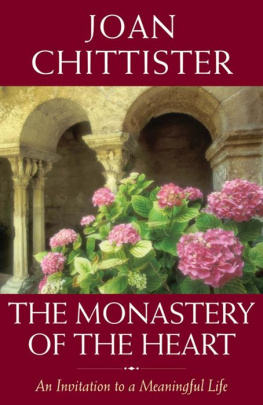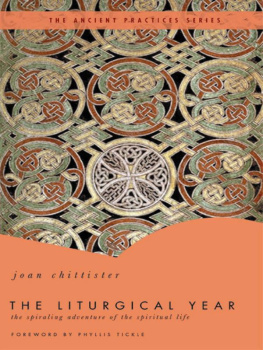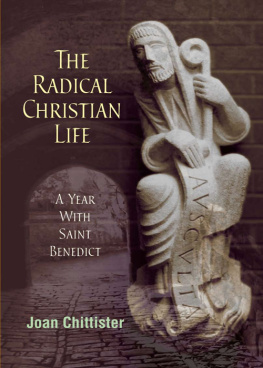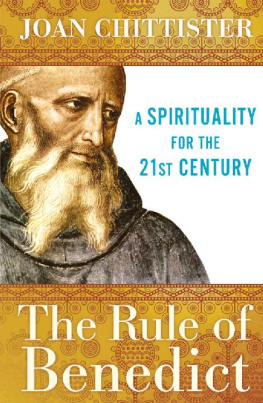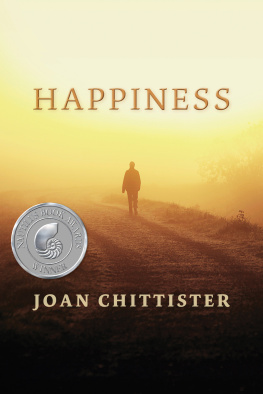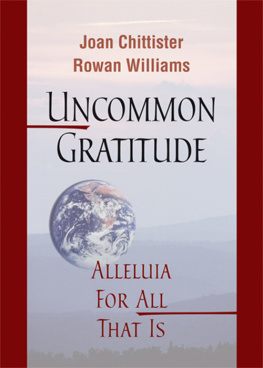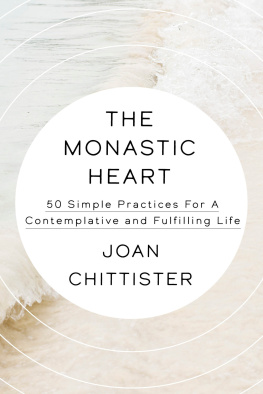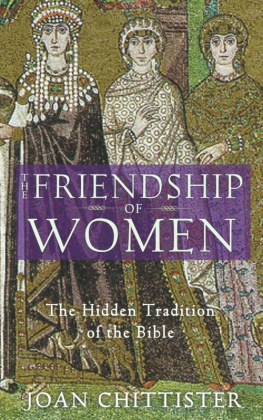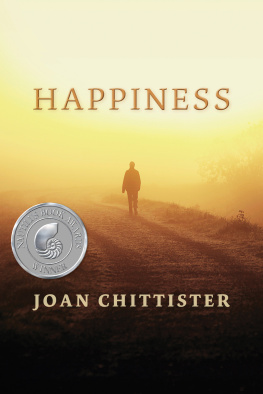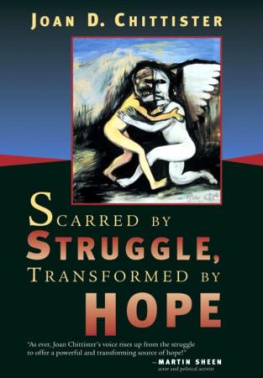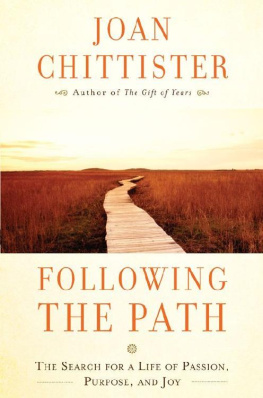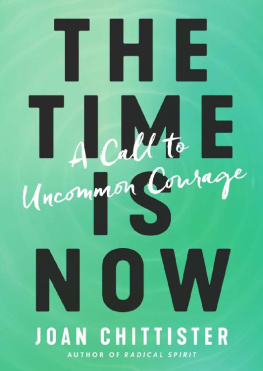Joan Chittister - The Monastery of the Heart: An Invitation to a Meaningful Life
Here you can read online Joan Chittister - The Monastery of the Heart: An Invitation to a Meaningful Life full text of the book (entire story) in english for free. Download pdf and epub, get meaning, cover and reviews about this ebook. year: 2011, publisher: Independent Publishers Group, genre: Religion. Description of the work, (preface) as well as reviews are available. Best literature library LitArk.com created for fans of good reading and offers a wide selection of genres:
Romance novel
Science fiction
Adventure
Detective
Science
History
Home and family
Prose
Art
Politics
Computer
Non-fiction
Religion
Business
Children
Humor
Choose a favorite category and find really read worthwhile books. Enjoy immersion in the world of imagination, feel the emotions of the characters or learn something new for yourself, make an fascinating discovery.
- Book:The Monastery of the Heart: An Invitation to a Meaningful Life
- Author:
- Publisher:Independent Publishers Group
- Genre:
- Year:2011
- Rating:4 / 5
- Favourites:Add to favourites
- Your mark:
- 80
- 1
- 2
- 3
- 4
- 5
The Monastery of the Heart: An Invitation to a Meaningful Life: summary, description and annotation
We offer to read an annotation, description, summary or preface (depends on what the author of the book "The Monastery of the Heart: An Invitation to a Meaningful Life" wrote himself). If you haven't found the necessary information about the book — write in the comments, we will try to find it.
The Monastery of the Heart: An Invitation to a Meaningful Life — read online for free the complete book (whole text) full work
Below is the text of the book, divided by pages. System saving the place of the last page read, allows you to conveniently read the book "The Monastery of the Heart: An Invitation to a Meaningful Life" online for free, without having to search again every time where you left off. Put a bookmark, and you can go to the page where you finished reading at any time.
Font size:
Interval:
Bookmark:


Copyright 2011 by Joan D. Chittister
All rights reserved. No part of this book may be reproduced or transmitted in any form or by any means, electronic or mechanical, including photocopying, recording, or by any information storage and retrieval system, without permission in writing from the Publisher.
Quotations from the Rule of Benedict taken from
A Readers Version of the Rule of Saint Benedict in Inclusive Language, edited and
adapted by Sister Marilyn Schauble, O.S.B., and Sister Barbara Wojciak, O.S.B.
Text Copyrighted 1989 by Benedictine Sisters of Erie, Inc.,
Mount Saint Benedict Monastery 6101 East Lake Road, Erie, Pennsylvania 16511.
All rights reserved. Adapted from RB 80 Copyrighted 1981 by
The Order of St. Benedict, Inc., Collegeville, Minnesota.
Published by
Blue Bridge
An imprint of
United Tribes Media Inc.
www.bluebridgebooks.com
ISBN 9781933346342
Library of Congress Control Number: 2011006263
Jacket design by Angel Guerra
Cover image by Getty Images
Text design by Cynthia Dunne
Printed in the United States of America
10 9 8 7 6 5 4 3 2 1


To the Many Seekers,
After more than fifty years of life in a monastery, I have begun to sift and sort the effects of it all, asking myself, whatif anythingof monastic life is worth passing on to others in this day and age? What of this life has any impact or import to populations other than monastic communities themselves and how can those outside traditional monasteries, too, join throngs of monastics over the centuries who have found this life both enriching and enlightening?
This book is, then, a kind of guide and invitation for those seekers who stand in the midst of a seething, simmering world of spiritual as well as secular options, overwhelmed by choices, and looking for the rhythm of a better life. It suggests a model upon which to buildor rebuildtheir own lives. It offers a template to guide them through the maze of empty promises, seductive dead ends, and useless panaceas the modern world, a spiritless culture, has to offer.
The search for God is an eternal one. It plagues every generation. It stalks every soul. It is the insistent, eternal cry for meaning, for answers to the questions, Why? And what? And for what purpose? It is the unending awareness that I am not alone in the universe, despite the fact that I do not know where I have come from or to what Im going. It is the soulful pursuit launched to understand the Beginning of Life and to find the answer to its End. The search for God is the attempt to complete the incomplete in us. And it never stops eating away at the innards of our soul.
Every age, every path, has answered the questions of the spiritual dimensions of life in ways peculiar to itself, in language and symbols and lifestyles it could understand. For some, in the past, the search to unite with the One, with the Energy, with the Life of life, took the form of desert asceticism. For others, it lay in community and communal worship. For many, it was an attempt to withdraw from the business of this world in order to be better attuned to the next.
But for one man, for Benedict of Nursia, the spiritual life lay in simply living this life, our daily life, well. All of it. Every simple, single action of it. History attests to the proof of the power of such a life lived to turn the ordinary into an experience of the extraordinary union with the God of the Universehere and now. Benedictine spirituality, the ongoing legacy of this sixth-century founder of cenobitic monasticism in the West, to our own times, is proof of its enduring value.
This spirituality based on the Rule of Benedict, a communal lifestyle, is over 1,500 years old. It developed at a time when Europe lay in political, economic, communal, and social disarray. And it exists to this dayaround the world. Anything that survives the ages with new vitality in every age is surely worthy of serious spiritual examination in our own.
Most significant, perhaps, is that instead of setting out to reform the decadence of sixth-century Italy, Benedict of Nursia simply ignored the cheap and chaotic superficiality of it all to live according to different standards, to walk a different path, to live the life everyone else livedbut differently. Through the ages, thousands of others have done the same. As a result, Benedictinism has evolved from age to age, until many different forms of its past impulses exist yetbut all of them as carriers of the original impulse.
Today, in this time of cataclysmic social upheavals, of global transitions, of technological breakthroughs of unimagined proportions, we must do the same. Old patterns are breaking down; individuals, families, and small groups everywherein intentional communities and home worship, in parishes and prayer groups, through committed lifestyles and private disciplinesare seeking to shape new ways of living for themselves in the shell of the old.
This small guidefollowing the ancient Rule of Benedict that is still the basic worldview and organizational pattern for life in Benedictine monasteries everywhereis meant to be a new way to live a meaningful spiritual life in the center of the world today, rather than withdraw from it. It does not abandon traditional Benedictine spirituality in favor of some new or exotic spiritual practice. On the contrary, it is anchored in the Rule, rooted in its values. It is an apple falling off an ancient tree, a cutting meant to grow steeped in its history, fresh in its form.
May the women and men, the families, the intentional communities who seek to create within themselves a Monastery of the Heart, find there the God who is forever seeking them.

A Gentle Invitation

Listen carefully to my instructions With the good gifts which
are in us, we must obey God.
To live the God-life,
Benedictine spirituality asserts
as its foundation
that we must immerse ourselves
in the Word of God
as model and guide,
as vision and measure,
of the good and happy life.
To seek God
in a Monastery of the Heart, then,
we must, first of all,
read the scriptures
intensely.
It is in the scriptures
that the eternal vitality
of Benedictine spirituality lies.
It is through immersion
in the Word of God
that the search for meaning
erupts into a life lived in union
with the God
whose presence we seek.
It is through the scriptures that
we follow the Israelites
chosen as they were,
and yet often as inconstant
as they were
and see at work in ourselves
all that God saw in them:
the worship of our private little idols
of money and power and status
that lure us away
from the real treasures of life.
We must, at the same time,
come to trust that we carry within us
the same signs of goodness
and faith and desire for life
that took Israel
through the desert of despair
to the Promised Land
Font size:
Interval:
Bookmark:
Similar books «The Monastery of the Heart: An Invitation to a Meaningful Life»
Look at similar books to The Monastery of the Heart: An Invitation to a Meaningful Life. We have selected literature similar in name and meaning in the hope of providing readers with more options to find new, interesting, not yet read works.
Discussion, reviews of the book The Monastery of the Heart: An Invitation to a Meaningful Life and just readers' own opinions. Leave your comments, write what you think about the work, its meaning or the main characters. Specify what exactly you liked and what you didn't like, and why you think so.

